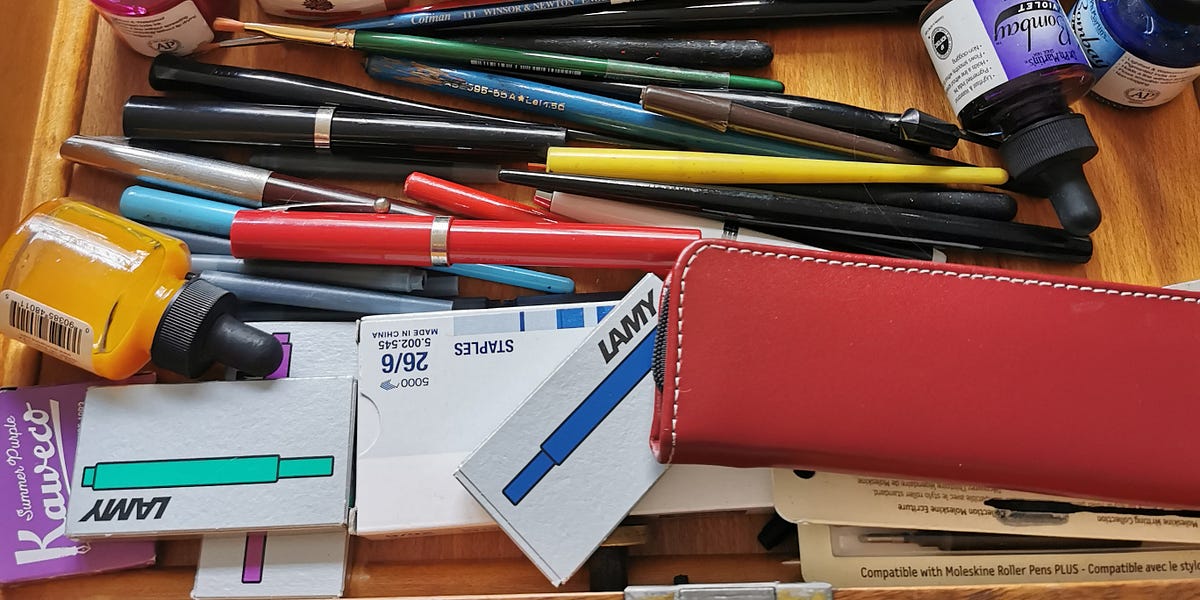Students with banking aspirations act out fantasies of prestige
If you get a job in the front office of an investment bank, it's pretty prestigious. Only 1%- 1.5% of students are accepted, and parading the merch has long been a source of dopamine (excepting the time that Goldman Sachs advised employees to stop displaying its logo after the financial crisis). Now, students still at university have found a way to get themselves some of that prestige before they even get the offers.
Get Morning Coffee ☕ in your inbox. Sign up here.
Finance clubs.
University finance clubs are nothing new. But Business Insider says they've morphed into a new source of exclusivity. At Columbia University, there are "lines and lines" of would be joiners at student events. At Georgetown's McDonough School of Business, so many students want to join the finance clubs that sophomores have been banned. At Wharton, finance club membership is restricted to 300 people to preserve "bandwidth."
The immense popularity of student finance clubs means the students running them are in the position of kingmakers. As campus deities with knowledge of DCFs and privileged access to bankers and banks, they are flexing hard.
Elite college finance clubs are now so elite, that Business Insider says they only accept 10% of applicants and there are often multiple rounds of interviews to join them. The demigods running the clubs fire questions at hopeful students in suits, who've been known to freeze and sob when they can't answer. "It's hypercompetitive, it's overwhelming, and you have to be pushing constantly," says one club-runner, keenly observing that finance clubs mimic the banking industry itself.
Is it worth it? If you run a club, you get a deep waft of superiority and the opportunity to network directly with senior figures in financial services (Students at Trinity College Dublin recently signed up Jim Esposito, president of Citadel Securities for a chat). If you're a member of a club, you not only get to say you've joined, but to be part of a "résumé book" and to access "résumé drop links" that banks and hedge funds only give to elite club members.
What if you don't want to wear a suit as a student and to suck-up to the demiurges running the special clubs in your midst? Then you won't get privileged access to finance employers or early DCF expertise. "Kids are just so much less prepared," laments one student locked out of the elite clubs at Georgetown.
There is another possibility, though. You can always start your own open-access group. The auspiciously named, Jonathan Rothschild, a student at Georgetown, has done just this. His group lets anyone in as long as they pass a general knowledge test. It provides students with finance training and has [somehow] achieved $150k in AUM by raising money from members. Rothschild himself is called its co-CEO. But he doesn't put students through five rounds of interviews and make them cry.
Separately, hedge funds have got a new refrain when they fire people. - The people being let go weren't managing any money.
Eisler Capital repeated this during last week's staff cuts, and now Walleye is saying the same thing.
Named after a fish rather than Marty Feldman, Walleye has let go of its credit and commodities teams, but says this is ok because they were only managing 1% of its risk. Bloomberg says Walleye now plans to focus on volatility, quantitative and fundamental long-short investing instead. The portfolio managers it's ejected joined in 2022. Walleye has a history of tweaking its focus. It also cut various macro portfolio managers last year and hired and fired various people in its London office.
JPMorgan expanded a programme aimed at students from lower socio-economic areas in the UK. It's working with Uptree, a careers non-profit organisation to promote the programme in local schools in areas where students face greater barriers. (JPMorgan)
Banking analyst Mike Mayo thinks JPMorgan might be worth $1 trillion soon. “It would involve our ‘good case’ scenario, effective deployment of record excess capital, and a stock that trades at a P/E achieved in Trump 1.0.” (Bloomberg)
Nomura relocated global co-head of equities trading Shinichiro Eguchi from its headquarters in Tokyo to its London office in recent weeks. (Financial News)
Eric Slesinger once developed gadgets for CIA agent. Now he's a VC. (Techcrunch)
Madhu Namburi, a veteran JPMorgan Chase & Co. technology banker, is leaving the bank after 25 years to join venture capital firm General Catalyst as an MD. (Bloomberg)
It's not easy being a managing director in investment banking: "You spend 80-90% of your time pitching, and often unsuccessfully. The hit rate is low – it’s just the nature of the business." (St. Gallen Business Review)
Evercore is expanding in Saudi Arabia. (Bloomberg)
People don't like it when other people flip coins and they lose out. They consider it unfair and don't like the flipper. (BPS)
It seems that Treasury Secretary Scott Bessent is now in control of trade policy and markets are glad. (WSJ)
, or email [email protected]. Signal also available.
Bear with us if you leave a comment at the bottom of this article: all our comments are moderated by human beings. Sometimes these humans might be asleep, or away from their desks, so it may take a while for your comment to appear. Eventually it will – unless it’s offensive or libellous (in which case it won’t.)











